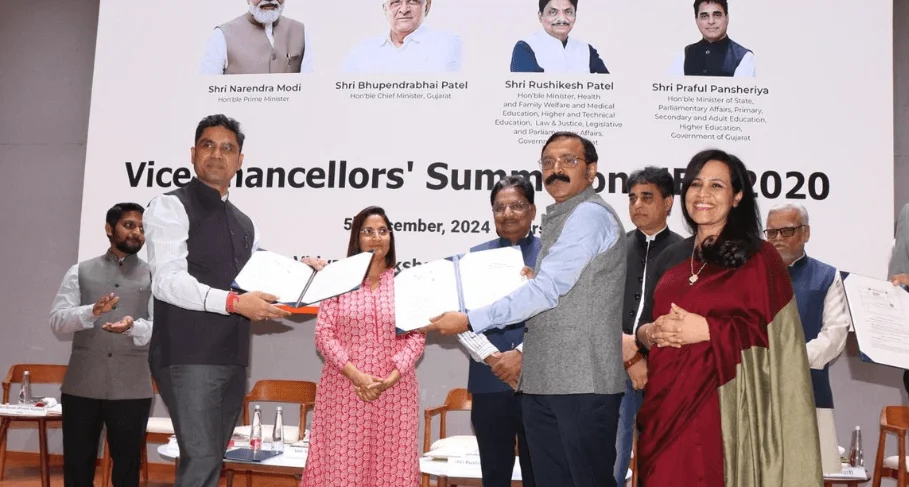In partnership with the Edunet Foundation, the Gujarat Knowledge Society (Commissionerate of Technical Education, Gujarat), a government initiative committed to bridging the gap between education and industry by equipping individuals with industry-relevant skills and certifications, has announced the Skills4Future Programme to equip Gujarat’s youth with future-ready skills.
This initiative, supported by Shell India, aims to revolutionize technical education in Gujarat by addressing significant skill gaps and providing engineering students with the cutting-edge technologies required to drive the Industry 4.0 revolution. The effort seeks to train 10,000 students in primary skills and 2,500 in advanced technologies annually.
Digital and Electric Vehicle (EV) Training Labs will be set up in specific engineering colleges as part of this mission. These labs, funded by Shell India’s Corporate Social Responsibility (CSR) initiative, will act as experiential learning hubs, hosting hackathons, invention contests, and advanced training sessions. Its curriculum, connected with the Gujarat Knowledge Society’s credit-based system, consists of a 50-hour Foundation Course and a 160-hour Advanced Course, focusing on hands-on applications in AI, sustainability, and clean technology.
Speaking on the partnership, Bannchha Nidhi Pani (IAS), Commissioner of Technical Education, Government of Gujarat, Gujarat Knowledge Society, said:
Our collaboration with Shell and Edunet Foundation marks a milestone in bridging education on Artificial Intelligence with Green skills, which is essential for today’s generation by providing employability. By integrating industry expertise and hands-on training, this program ensures that our students are prepared to lead in the rapidly evolving tech-driven world.
The curriculum aims to boost the learning ecosystem through in-person faculty development seminars guided by industry professionals. These seminars will enable educators to provide world-class, industry-relevant training, thereby increasing the programme’s effect. This collaboration will improve the state’s technical education by encouraging innovation, sustainability, and employability.
Participants will receive co-branded certificates from industry partners, enhancing their credentials. Furthermore, the programme will provide excellent placement opportunities by connecting students with local and regional enterprises, government agencies, and the local startup ecosystem. These connections aim to assist students in finding work or developing their businesses.
Rahul Singh, Managing Director, Shell Energy India Pvt Ltd, added:
Our partnership with the Gujarat Knowledge Society and Edunet Foundation underscores Shell’s commitment to equipping youth with future-ready skills such as AI and cleaner technologies. By fostering experiential learning and industry-aligned training, the Skills4Future project will empower students in Gujarat with essential employability skills to meet the evolving demands of the modern workforce.
With a vision to create a qualified, job-ready workforce, Gujarat Knowledge Society emphasizes outcome-based education, vocational training, and ICT-enabled skill development. Over and above, it connects students to apprenticeship and placement opportunities in diverse industries while guiding youth toward jobs that align with their educational qualifications and equipping them with expertise through training programmes. It also empowers working professionals to enhance their skills and stay competitive in the job market.
Nagesh Singh, Executive Director of Edunet Foundation, also stated:
It is a matter of pride to collaborate with GKS and Shell India to execute this pioneering, future-forward programme is a matter of pride. We empower Gujarat’s youth to thrive in an era of technological innovation and sustainability. Skills4Future is an educational initiative and a catalyst for a positive, long-term economic and environmental impact.
Edunet Foundation, founded in 2015, is a non-profit organization that works in skill development, livelihood enhancement, and STEM education. It has a presence across India, with core headquarters in Bengaluru and Gurugram. The platform’s programmes aim to improve participants’ employability and entrepreneurial skills. It serves a varied audience through the national school system, industrial training institutes, engineering colleges, and other academic institutions. Skills taught include career readiness and future skills such as problem-solving, communication, cooperation, and technology.
